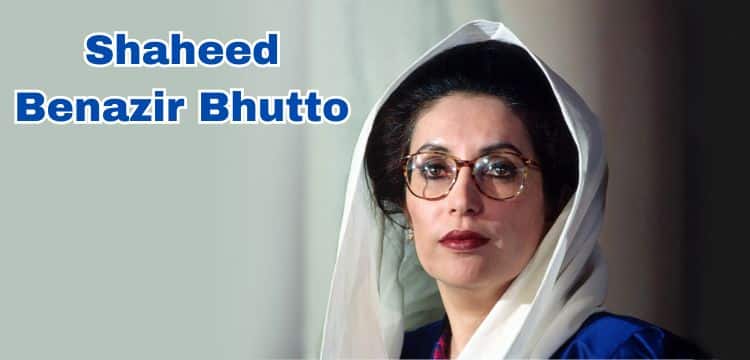Shaheed Benazir Bhutto, a prominent figure in Pakistani politics, left an indelible mark on her nation. From her early life to her enduring legacy, this article provides a comprehensive exploration of Shaheed Benazir Bhutto, with a focus on institutions named after her, her age, notable books, her daughter, and the unfortunate details surrounding her death.
Shaheed Benazir Bhutto Biography
| Category | Details |
| Name | Benazir Bhutto |
| Nickname | BB, Iron Lady |
| Born | June 21, 1953, Karachi, Pakistan |
| Spouse | Asif Ali Zardari (Married in 1987) |
| Children | Bilawal, Bakhtawar, Aseefa |
| Parents | Zulfikar Ali Bhutto, Nusrat Bhutto |
| Education | Radcliffe College, Harvard: Bachelor of Arts (BA) Lady Margaret Hall, Oxford: Bachelor of Arts (BA) in Philosophy, Politics, and EconomicsSt Catherine’s College, Oxford: Master of Studies (MSt) in International Law |
| Political Party | Pakistan Peoples Party (PPP) |
| First Term As PM | 11th Prime Minister of Pakistan, December 2, 1988 – August 6, 1990 |
| Second Term As PM | 13th Prime Minister of Pakistan, October 18, 1993 – November 5, 1996 |
| Death | Assassinated on December 27, 2007, in Rawalpindi, Pakistan |
| Resting Place | Bhutto family mausoleum |
Shaheed Benazir Bhutto’s Early Life
Born into a prominent political family in Karachi, Pakistan, Benazir Bhutto embarked on an academic journey at Harvard’s Radcliffe College at the age of 16. Following the completion of her undergraduate studies at Radcliffe, she pursued further education at Oxford University in England, earning a second degree in 1977.
Her father, Zulfikar Ali Bhutto (1928-1979), served as the ninth Prime Minister of Pakistan from 1973-1977 and as the fourth President of Pakistan from 1971-1973.
Upon returning to Pakistan later that year, she faced a tumultuous political landscape. Her father, who had been elected Prime Minister, was imprisoned after a military coup shortly after her arrival. In 1979, he was executed by the military government led by General Zia Ul Haq.
Benazir Bhutto herself experienced multiple arrests over the subsequent years, enduring three years of detention before being allowed to leave the country in 1984. Settling in London, she, along with her two brothers, established an underground organization to oppose the military dictatorship. In 1985, when her brother Shahnawaz passed away, she returned to Pakistan for his burial and was once again arrested for participating in anti-government rallies.
Read Also: Waseem Badami Biography
Shaheed Benazir Bhutto’s Age and Family
Benazir Bhutto passed away on December 27, 2007, in Rawalpindi. At the time of her death, she was 54 years old. Her family, including Benazir Bhutto’s son, Bilawal Bhutto Zardari, has played a significant role in carrying forward her political legacy.
Bilawal Bhutto Zardari, Benazir Bhutto’s son, inherited the political mantle after her tragic demise. He continues to be an influential figure, working towards the goals and ideals set by his mother.
Shaheed Benazir Bhutto’s Political Challenges and Exile
Low voter turnout characterized the 1997 elections, during which Bhutto’s PPP faced a significant defeat against Sharif’s PML-N. Sharif’s administration, with cooperation from British and Swiss authorities, persisted in pursuing corruption charges against Bhutto. In 1999, a Lahore court convicted both Bhutto and her husband— a controversial businessman and senator, previously jailed since 1996 on various charges— of corruption. However, the Supreme Court overturned this decision in 2001 due to evidence of governmental interference.
Despite her unsuccessful attempts at a political resolution following Gen. Pervez Musharraf’s 1999 coup, Bhutto’s demands for dropping charges were rejected, impacting negotiations for her return from self-imposed exile. Faced with standing arrest warrants in Pakistan, Bhutto remained in exile in London and Dubai throughout the late 90s.
Musharraf’s 2002 decree, barring prime ministers from serving a third term, prevented Bhutto from participating in the elections that year. Furthermore, a 2000 legislation prohibiting a court-convicted individual from holding party office posed a challenge to her party, prompting the PPP to split. A new, legally distinct branch, the Pakistan People’s Party Parliamentarians (PPPP), was established. The PPPP, free from the restrictions imposed by Bhutto’s leadership, participated in the 2002 elections and garnered a substantial vote.
Despite the PPPP’s success, Bhutto’s conditions for cooperation with the military government— the withdrawal of all charges against her and her husband— remained unmet. In 2004, Bhutto’s husband was released on bail and joined her in exile. As the 2007 elections approached, discussions surfaced about Bhutto’s potential return to Pakistan.
Read Also: Bilal Abbas Khan Biography
Benazir Bhutto’s Death/Assassination
Benazir Bhutto was assassinated on December 27, 2007, during an election campaign rally in Rawalpindi. An assailant fired shots and then detonated himself, resulting in Bhutto’s death. The attack claimed the lives of 28 others and left over 100 wounded. The incident occurred shortly after Bhutto addressed a massive rally in Rawalpindi, just 8 miles south of Islamabad. Contrary to initial reports, she succumbed to head injuries from hitting a part of her vehicle’s sunroof, not from bullets or shrapnel, according to a spokesman for Pakistan’s Interior Ministry. President Musharraf sought assistance from Britain’s Scotland Yard to aid in the investigation.
On December 28, 2007, hundreds of thousands of mourners gathered to bid farewell to former Pakistani Prime Minister Benazir Bhutto. She was laid to rest at her family’s mausoleum in Garhi Khuda Bakhsh, located in the southern province of Sindh.
Shaheed Benazir Bhutto’s Husband Asif Ali Zardari Who Became President of Pakistan
Accusations circulate in Pakistan, alleging Asif Zardari’s involvement in orchestrating Benazir Bhutto’s assassination. While critics argue he benefited from her death, no evidence supports this claim. Zardari faces additional criticism for inadequate police investigations into Bhutto’s murder. Despite his defence of involving Scotland Yard and a UN commission, the latter was obstructed by both the military and Zardari’s ministers. The inquiry faced challenges, including the withdrawal of essential resources and safe housing.
Shaheed Benazir Bhutto’s Contributions
Legacy in Institutions
1. Benazir Bhutto Hospital
One enduring aspect of her legacy is the Benazir Bhutto Hospital, a medical institution dedicated to providing healthcare services. Established to honor her commitment to public welfare, the hospital stands as a testament to her vision for a healthier nation.
2. Benazir Bhutto University
Another testament to her commitment to education is Benazir Bhutto University. This institution reflects her belief in the transformative power of education and serves as a hub for academic excellence.
Shaheed Benazir Bhutto Books
In addition to her political contributions, Benazir Bhutto was an accomplished author. Two noteworthy books include her autobiography “Daughter of the East” (1988) and the posthumously published “Reconciliation: Islam, Democracy, and the West” (2008).
Read Also: Salma Hassan Biography
Conclusion
In conclusion, Benazir Bhutto’s life and legacy continue to resonate through institutions, literature, and her family’s ongoing commitment to public service. Her impact on Pakistan’s political landscape and her enduring contributions are honored through institutions such as the Benazir Bhutto Hospital and Benazir Bhutto University.
Frequently Asked Questions (FAQs)
1. What Was Benazir Bhutto Famous for?
Benazir Bhutto was renowned for being the first woman leader of a Muslim nation in modern history. She served as the Prime Minister of Pakistan for two non-consecutive terms, marking a historic achievement in her political career.
2. When Did Benazir Get Married?
Benazir Bhutto married Asif Ali Zardari on December 18, 1987, in a union that played a significant role in her personal and political life.
3. Did Benazir Bhutto Have Children?
Yes, Benazir Bhutto and Asif Ali Zardari had three children: Bilawal Bhutto Zardari, Bakhtawar Bhutto Zardari, and Aseefa Bhutto Zardari.
4. Is Shaheed Benazir Bhutto University Private?
No, Shaheed Benazir Bhutto University is a public university dedicated to providing educational opportunities in line with Benazir Bhutto’s commitment to accessible and quality education.
5. When Did Benazir Bhutto Get Married?
Benazir Bhutto married Asif Ali Zardari on December 18, 1987, forming a partnership that played a pivotal role in both her personal and political life.
6. Which University Did Benazir Bhutto Attend?
Benazir Bhutto attended Harvard University, where she obtained her Bachelor of Arts (B.A.) degree in 1973. She later pursued postgraduate studies at the University of Oxford, earning degrees in philosophy, political science, economics, and international law.
7. Where is Benazir Bhutto Buried?
Benazir Bhutto is buried in the Bhutto family mausoleum in Garhi Khuda Bakhsh, Larkana, Sindh, Pakistan. The mausoleum serves as the final resting place for several members of the Bhutto family.











